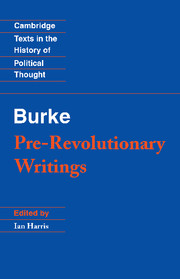Book contents
- Frontmatter
- Contents
- Preface
- Acknowledgements
- Abbreviations
- Chronological table
- Introduction
- A note on the texts
- Biographica
- Bibliography
- ‘Extempore Commonplace on The Sermon of Our Saviour on the Mount’
- A Vindication of Natural Society
- A Philosophical Enquiry into the Origin of our Ideas of the Sublime and Beautiful
- ‘Religion’
- Tracts on the Popery Laws
- Thoughts on the Cause of the Present Discontents
- Conciliation with America
- ‘Almas Ali Khan’
- ‘Speech on the Army Estimates’
- Index of persons
- Index of subjects and places
- Cambridge Texts in the History of Political Thought
Tracts on the Popery Laws
Published online by Cambridge University Press: 05 June 2012
- Frontmatter
- Contents
- Preface
- Acknowledgements
- Abbreviations
- Chronological table
- Introduction
- A note on the texts
- Biographica
- Bibliography
- ‘Extempore Commonplace on The Sermon of Our Saviour on the Mount’
- A Vindication of Natural Society
- A Philosophical Enquiry into the Origin of our Ideas of the Sublime and Beautiful
- ‘Religion’
- Tracts on the Popery Laws
- Thoughts on the Cause of the Present Discontents
- Conciliation with America
- ‘Almas Ali Khan’
- ‘Speech on the Army Estimates’
- Index of persons
- Index of subjects and places
- Cambridge Texts in the History of Political Thought
Summary
Introduction
When Burke reminisced about Ireland in 1780, after fifteen years devoted largely to the politics of England and America, he claimed that on first entering Parliament ‘What was first and uppermost’ in his thoughts was the hope ‘to be somewhat useful to the place of my birth and education, which in many respects, internal and external, I thought ill and impolitically governed’. This is likely enough, for Ireland preoccupied Burke from his teens. His earliest speeches and writings, composed as an undergraduate, provide many criticisms of Irish society, especially its disregard for good taste, its low morals and economic backwardness. These points focussed, in the end, on the failure of the propertied order of Irish society to provide the leadership which their station made possible.
Did Burke react against that order? He had a sense of its potential for good. He mentioned the case of one gentleman who had benefited his tenants greatly by a benevolent policy of improving his estate. The example was not entirely isolated. Another observer suggested that ‘a man has a figure in his country in proportion to the improvements he makes’. When Arthur Young toured Ireland a little later (in 1776) he found a number of agricultural improvers at work. A few years before Burke himself had arranged that ‘one of the finest bull calves … of the short-horned Holderness breed’ should be sent to a cousin's farm.
- Type
- Chapter
- Information
- Pre-Revolutionary Writings , pp. 88 - 102Publisher: Cambridge University PressPrint publication year: 1993

